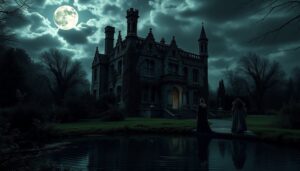*The Secret History* pulls you in with its hauntingly beautiful prose and complex characters. Set among elite students at Hampden College, it unravels a murder that ignites deep guilt and betrayal. You'll find yourself questioning morality as Richard, the narrator, navigates a world filled with intellectual elitism and dark ambitions. Tartt's unique style blends philosophical themes and classical references, making every page compelling. The psychological toll on the characters provides insight into the human condition that is hard to forget. If you're captivated by these themes, you'll discover even more as the story unfolds.
Overview of The Secret History
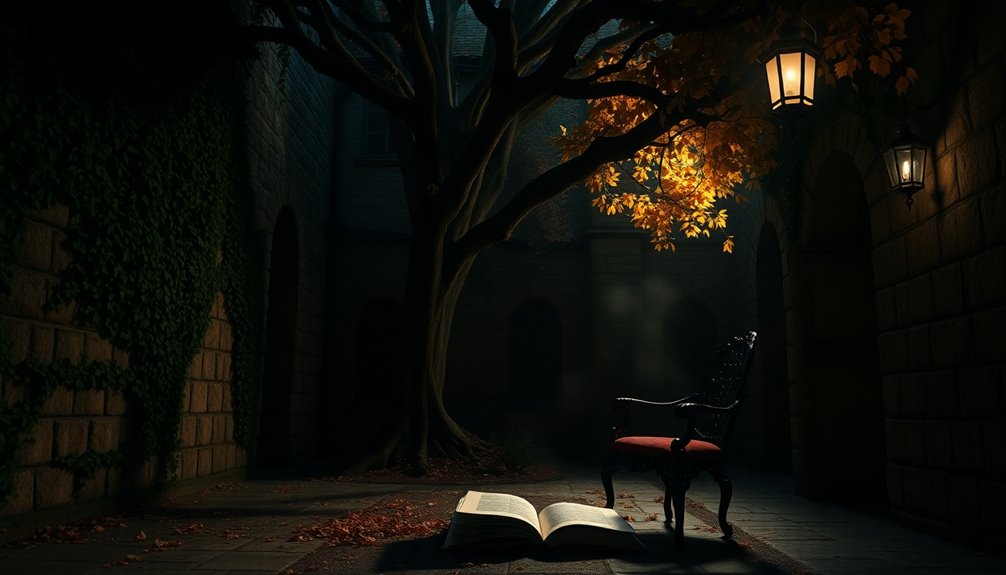
*The Secret History* draws you into the enigmatic world of Hampden College, where a group of elite students studies ancient Greek under the influence of their charismatic professor.
Narrated by Richard Papen, the story kicks off with a shocking murder that sets the tone for a deep exploration of morality and the dark undertones of intellectual elitism. The characters' journey echoes the complexities of human nature and unfulfilled dreams, reminiscent of the struggles faced by the Wheelers in Revolutionary Road. As the narrative unfolds, you'll find that the complex relationships among the characters mirror the intricate dynamics of the Atwood family.
As you navigate the dual timeline, you witness the psychological fallout from the murder of Bunny Corcoran, which profoundly impacts the remaining characters.
Tartt's rich prose immerses you in their world, revealing the allure and dangers that come with beauty and knowledge. This gripping tale not only captivates but also critiques the seductive nature of secrets and the lengths individuals will go to protect them. The narrative encapsulates themes of betrayal and revenge that resonate throughout the characters' complex relationships.
Author Background
When you consider Donna Tartt's background, you'll find that her early life shaped her intricate storytelling style.
Her impressive literary achievements, including awards like the Pulitzer Prize, highlight her talent and influence in contemporary literature. Tartt's work reflects a nuanced understanding of societal themes, similar to Huxley's exploration of the dangers of technological advancement and societal control. Her narratives often mirror the themes of courageous protagonists from fantasy literature, showcasing characters who embark on transformative journeys.
Plus, her unique writing style, infused with philosophical themes and dark academia elements, sets her apart in the literary world. Additionally, Tartt's exploration of social issues resonates with the themes found in the works of influential authors like Richard Wright.
Early Life Influences
Growing up in Greenwood, Mississippi, Donna Tartt's Southern upbringing deeply shaped her writing style and themes, weaving moral complexity into her narratives. Her parents fostered a love for literature; her mother worked as a school librarian, while her father's success in business provided a stable environment.
Attending Bennington College ignited her literary ambitions and allowed her to explore themes of elitism and academia, which became central to *The Secret History*. Tartt's fascination with classics, especially Greek and Roman texts, flourished during her studies, profoundly influencing her storytelling.
Early writing experiences, such as contributing to her high school newspaper and winning contests, showcased her passion and foreshadowed the intricate narratives she'd later create, rich with intellectual depth.
Literary Achievements Overview
Tartt's early life and academic experiences laid the groundwork for her impressive literary career.
Her debut novel, *The Secret History*, published in 1992, introduced readers to the enchanting world of Richard Papen and the elite New England college setting, sparking interest in the dark academia sub-genre.
With an initial print order of 75,000 copies, it quickly garnered attention, showcasing Tartt's talent for intricate narratives.
Her subsequent works further solidified her status, culminating in winning the Pulitzer Prize for Fiction in 2014 for *The Goldfinch*.
Tartt's writing, marked by deep psychological insights, has reached a global audience, translated into forty languages, reflecting her profound impact on contemporary literature and the lasting allure of her themes.
Notable Writing Style
Rich, descriptive prose defines the writing style in *The Secret History*, immersing you in its vivid imagery and emotional depth.
Tartt's prose captivates through first-person narration, providing an intimate, yet often unreliable perspective via Richard Papen. This technique invites you to question the moral ambiguity of the characters and their choices.
The narrative is layered with philosophical undertones, weaving in classical texts that deepen its complexity. Tartt's intricate language creates suspense while exploring profound themes like beauty and guilt.
Her lyrical quality captures the essence of youth and nostalgia, allowing you to feel the weight of the characters' experiences.
This distinctive style contributes greatly to the novel's acclaim as a modern classic in American literature.
Plot Summary
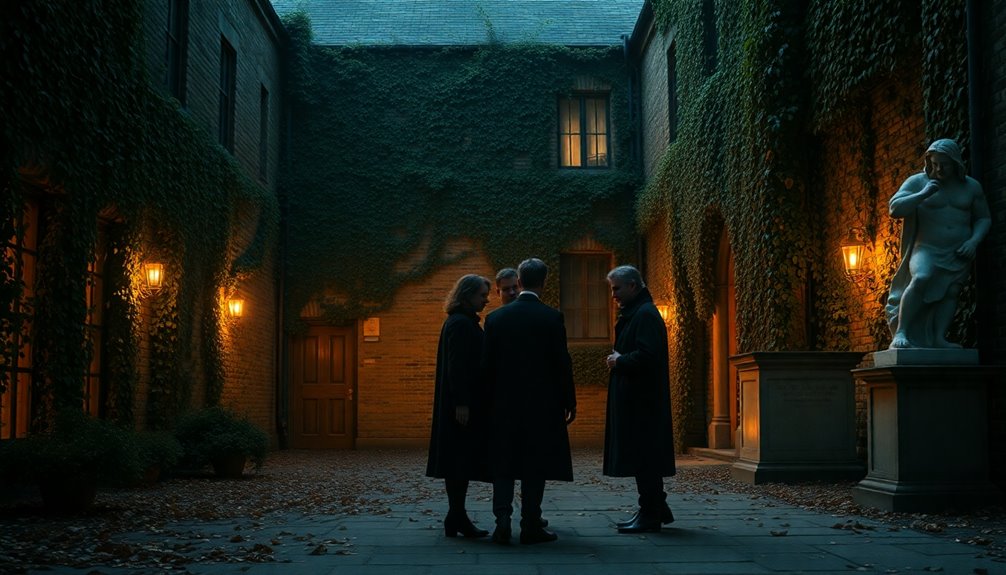
In *The Secret History*, you enter the elite world of Hampden College, where Richard Papen becomes intertwined with a group of charismatic, yet troubled students.
When Bunny Corcoran is murdered, the consequences of their actions unravel their lives, exposing deep-seated guilt and isolation. The narrative serves as a cautionary tale about the darker side of human ambition and the lengths individuals will go to achieve their desires, reminiscent of how collective action can amplify voices against oppression in historical contexts. This gripping tale explores how ambition and obsession can lead to moral decay in a seemingly glamorous environment, reflecting the complexities of power dynamics that perpetuate the struggles faced by marginalized individuals.
Elite College Environment
As you explore *The Secret History*, you'll find yourself immersed in the elite atmosphere of Hampden College, where a select group of students pursues an intense study of ancient Greek culture.
Richard Papen, a transfer from California, seeks acceptance among these privileged students, all drawn to the magnetic allure of their charismatic professor, Julian Morrow.
The group operates within a cult-like exclusivity, defined by their obsession with intellectualism and aesthetics.
However, this elite college environment masks a deeper moral decay, as the characters indulge in hedonistic pursuits that detach them from societal norms.
The bacchanal rituals they embrace highlight the darker aspects of their privileged lives, ultimately revealing the psychological toll of their elitist lifestyle.
Murder and Consequences
While the elite students of Hampden College initially seem to thrive in their intellectual pursuits, the murder of Bunny Corcoran shatters their carefully curated world.
This murder mystery unfolds during a bacchanal ritual, a chaotic descent that leads to betrayal and the death of a farmer. As Bunny discovers the truth, the psychological turmoil intensifies, engulfing the group in overwhelming guilt.
Each character, including the cold Henry, spirals into self-destruction, unable to escape the corruption of their actions. Their lives become a tangled web of lies, and the consequences of their choices ripple through their relationships and futures.
Ultimately, Bunny's murder serves as a haunting reminder of their past, leaving them forever changed and trapped in their guilt.
Guilt and Isolation
The aftermath of Bunny Corcoran's murder plunges the remaining characters into a deep well of guilt and isolation.
As Richard Papen navigates his desire for acceptance within this elite group, he finds himself increasingly detached.
The psychological unraveling begins when the classmates' shared secret of murder weighs heavily on their conscience, driving them to destructive behaviors.
The haunting guilt from Bunny's death intertwines with their lives, revealing the fragility of their bonds.
Richard's struggle with isolation intensifies, showcasing how their once vibrant camaraderie deteriorates under the shadow of their actions.
The epilogue starkly highlights the lasting consequences of guilt, leaving the survivors trapped in their emotional turmoil, forever marked by the darkness of their choices.
Key Characters
In "The Secret History," a tightly-knit group of elite students at a Vermont college becomes the focal point of a dark tale woven with intrigue and moral complexity.
Richard Papen, the unreliable narrator, seeks acceptance among this enchanting group, while the charismatic Henry Winter, their leader, embodies cold detachment and moral ambiguity. This reflects how unreliable narrators can shape perceptions of truth and reality in narrative storytelling.
Bunny Corcoran, charming yet manipulative, complicates their friendship, ultimately becoming the victim of their conspiracy.
The beautiful Camilla Macaulay adds an air of mystery, as her reactions to the group's dynamics reveal the complexities of desire and moral choice. This mirrors the psychological challenges of living a double life, akin to the burden of carrying sins, a theme present in many narratives of moral complexity.
Finally, her twin brother, Charles, struggles with alcoholism and represents the darker side of their indulgent lifestyle, highlighting the consequences of their elite existence. The narrative serves as a cautionary tale about the allure of obsession, reflecting the darker aspects of human relationships and the pursuit of status.
Themes of Guilt and Consequences
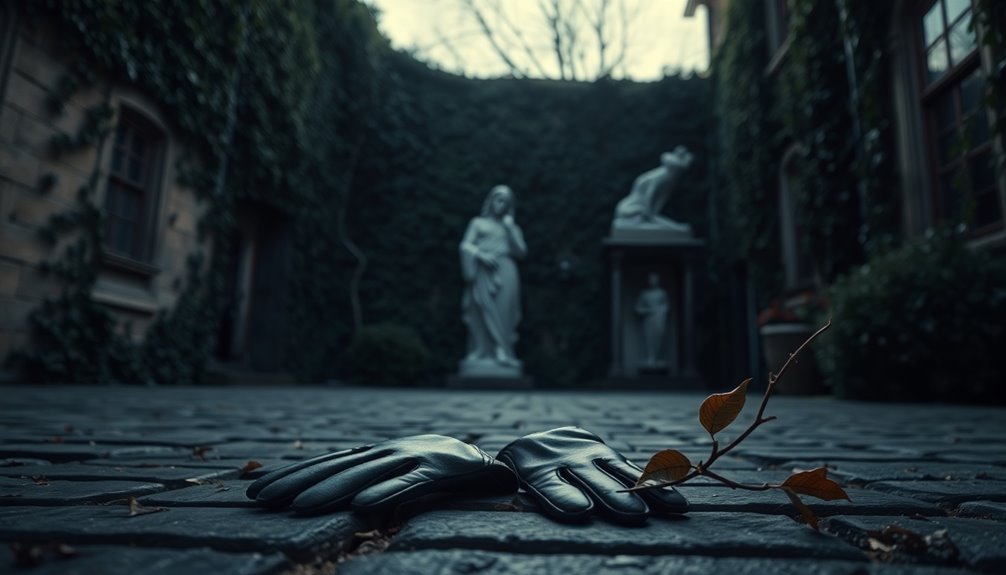
In "The Secret History," the murder of Bunny Corcoran triggers a spiral of guilt that profoundly affects each character. You see how their psychological struggles manifest in destructive behaviors and emotional turmoil, illustrating guilt's lasting impact. As their lives unravel, the consequences of betrayal become painfully clear, leaving you to ponder the true cost of their actions. This exploration of guilt parallels the themes of personal growth seen in Dickens' "David Copperfield," where characters endure their own struggles and seek redemption. Moreover, the narrative's focus on social class reflects the pressures that amplify these characters' moral dilemmas. The haunting presence of guilt also resonates with the theme of generational poverty in "A Tree Grows in Brooklyn," where the characters face the weight of their circumstances and the choices they make.
Psychological Effects of Murder
Guilt often creeps into the minds of those who've committed unforgivable acts, and in *The Secret History*, the psychological effects of murder unfold with haunting clarity.
The characters grapple with intense feelings of guilt and shame after Bunny's death, leading to emotional upheaval and mental deterioration.
Henry's cold detachment eventually spirals into self-inflicted violence, showcasing how guilt can manifest destructively.
Charles's experience of rage culminates in violent confrontations, revealing fractures in relationships and highlighting the psychological trauma they endure.
The bacchanal ritual acts as a catalyst for their turmoil, marking the loss of control that leaves profound emotional scars.
Ultimately, the consequences of their actions linger, painting a grim portrait of their psychological struggles.
Guilt's Lasting Impact
The weight of guilt lingers long after the act, shaping the lives of those involved and altering their realities. Bunny's death acts as a catalyst, forcing each character to confront their psychological burden.
You witness Henry's self-inflicted violence and Charles's descent into alcoholism as they grapple with their remorse. Richard's conflicting emotions at Bunny's funeral reveal the deep-seated guilt that festers within the group, highlighting the dissonance between their actions and feelings.
Tartt masterfully illustrates guilt's transformative power, showing how each character's attempts to escape their choices lead to further isolation and despair.
Ultimately, the epilogue underscores that the consequences of guilt extend beyond the moment of the act, haunting them as they navigate their fractured lives.
Consequences of Betrayal
Betrayal weaves a dark thread through the fabric of "The Secret History," revealing how deeply it scars relationships and individual psyches. The murder of Bunny Corcoran magnifies the consequences of betrayal, pushing each character into guilt-driven spirals.
You witness Richard's moral conflict as his silence festers into psychological distress, contrasting with Henry's chilling detachment.
- Charles's violent clash with Henry showcases how resentment escalates into tragedy.
- The emotional aftermath of both Bunny's murder and the earlier farmer's death during their ritual lingers heavily.
- The epilogue highlights the enduring scars that betrayal leaves behind, affecting the survivors indefinitely.
In this intricate web, betrayal's consequences extend far beyond the initial act, haunting them forever.
Character Dynamics
In the intricate web of *The Secret History*, character dynamics play an essential role in shaping the narrative's tension and conflict.
You'll find Richard Papen, an outsider keen for acceptance, entangled with a group of students marked by their moral decay.
Henry Winter stands as the intellectual leader, yet his complex nature often leads to manipulation among the group.
Bunny Corcoran's charm masks his manipulative tendencies, ultimately making him a tragic victim.
The orphaned twins, Charles and Camilla Macaulay, create contrasting tensions, with Charles battling addiction while Camilla remains alluringly enigmatic.
Francis Abernathy, the wealthy hypochondriac, serves as a sanctuary, highlighting privilege's vulnerability.
Richard's unreliable narration complicates your understanding, especially regarding Bunny, influencing the group's descent into chaos.
Exploration of Beauty and Desire
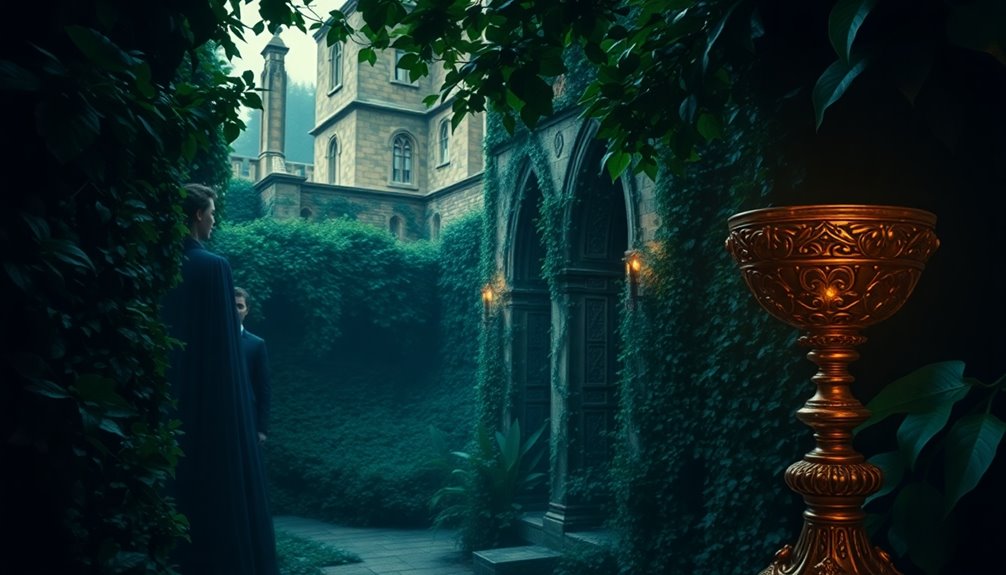
Amid the tangled relationships and moral ambiguity that characterize the group, beauty emerges as a powerful force driving their actions and desires.
You'll notice how the characters' obsession with physical beauty often masks their emotional emptiness, creating a tension that's hard to ignore. This pursuit leads them down paths of moral decay, revealing the darker side of their desire.
- The allure of beauty captivates but also ensnares them in guilt.
- Their extravagant lifestyles and drug use serve as self-escapism.
- The bacchanal rituals symbolize a dangerous loss of control.
Tartt's vivid imagery compels you to confront the relationship between aesthetics and ethics, illustrating how beauty can be both enchanting and perilous in the lives of these complex characters.
Narrative Style and Technique
While delving into *The Secret History*, you'll quickly notice that Tartt's use of first-person unreliable narration through Richard Papen invites you to question not just the events, but also the morality of his judgments about his peers.
The narrative structure employs a dual timeline, revealing pivotal moments before and after Bunny's murder, which heightens suspense and enriches character development.
Tartt's lyrical prose captivates you with its flowing beauty, while the atmospheric detail immerses you in the haunting Vermont setting. This juxtaposition of vivid imagery against dark themes illustrates the duality of beauty and moral decay.
Additionally, the inclusion of Greek, French, and Latin phrases deepens the intellectual resonance, connecting the characters' lives to classical literature.
Social Commentary

Tartt's exploration of elitism and privilege starkly critiques the insular world of academia. You see how the characters' affluent backgrounds breed entitlement and contribute to their moral decay.
Their obsession with knowledge and beauty creates an environment that fosters a cult-like mentality, blinding them to the consequences of their choices.
Consider these societal issues illustrated in the novel:
- The impact of racism and sexism on interpersonal dynamics
- The classism that underpins their interactions
- The moral failings surrounding Bunny's murder
Through Richard's unreliable narration, Tartt urges you to reflect on morality and the darker facets of human nature, challenging your conventional views of beauty and desire.
Critical Reception
Upon its release, *The Secret History* garnered generally positive reviews, with many praising its rich prose and complex characterizations. Critics highlighted its exploration of dark themes like morality, obsession, and betrayal, solidifying its reputation as a modern classic in American literature.
With an impressive average rating of 4.17 on Goodreads from over 870,000 ratings, it clearly resonated with readers. However, the critical reception wasn't without its critiques; some reviewers found the characters less relatable and questioned the emotional depth of the narrative.
Opinions also varied on the moral complexities intertwined with elitism, a recurring theme that sparked divided discussions among audiences. Overall, *The Secret History* remains a significant work within the dark academia genre.
Cultural Impact

Since its publication, *The Secret History* has greatly shaped the cultural landscape, particularly within the dark academia sub-genre. This novel has ignited a cultural movement centered around elitism and intellectualism, influencing both readers and writers.
Its inclusion in numerous lists of essential contemporary novels reflects its lasting impact.
Here are a few ways it resonates with audiences:
- Encourages exploration of complex moral dilemmas
- Inspires deep analyses of friendship and betrayal
- Fosters discussions about the human condition in literature
With an impressive 4.17 average rating on Goodreads, it's clear that The Secret History continues to engage and challenge readers, solidifying its place in modern literary conversations.
Legacy of Dark Academia
The legacy of dark academia thrives on a deep-seated fascination with intellectual pursuits and the complexities of human experience.
*The Secret History* serves as a cornerstone of this sub-genre, drawing readers into a world where beauty and ambition intertwine with moral ambiguity.
You'll find that the novel investigates the obsession of its characters, portraying their intense dedication to classical studies and the elitist environment of a liberal arts college.
Richard Papen, the unreliable narrator, encapsulates the struggles of this world, revealing the allure and dangers of intellectualism.
The exploration of beauty, guilt, and consequence resonates deeply, illustrating how the pursuit of knowledge can lead to moral decay, a hallmark of dark academia's enduring appeal.
Personal Reflections on the Novel
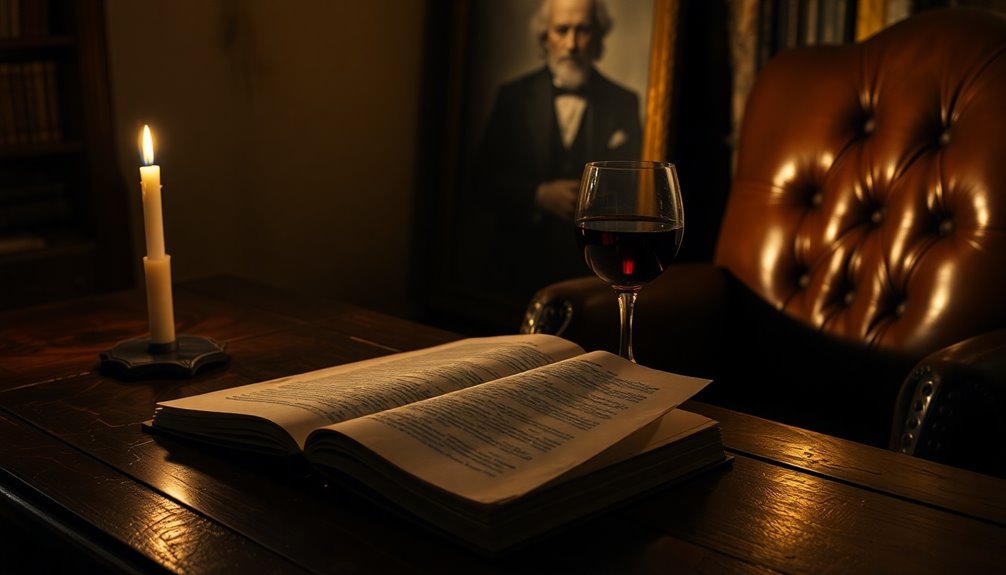
While diving into *The Secret History*, you can't help but feel the weight of its moral complexities and the haunting beauty of its prose. The novel's exploration of elitism and obsession draws you in, compelling you to confront the characters' psychological turmoil.
Tartt's vivid imagery makes the macabre feel almost beautiful, forcing you to question the nature of morality.
- The allure of academic elitism
- The consequences of obsession
- The depth of psychological conflict
You find yourself reflecting on the intricate relationships that mirror cult-like dynamics, filled with jealousy and betrayal.
Richard Papen's unreliable narration adds layers, inviting you to reconsider the very essence of truth within this tragic tale.
Conclusion
In "The Secret History," you find beauty intertwined with darkness, where the allure of intellectualism clashes with the haunting weight of guilt. Tartt's characters dance on the edge of morality, revealing how easily ambition can spiral into tragedy. As you close the book, you're left pondering the cost of knowledge and the shadows it casts. The novel isn't just a story; it's a mirror reflecting the complexities of your own choices, urging you to confront your truths.



